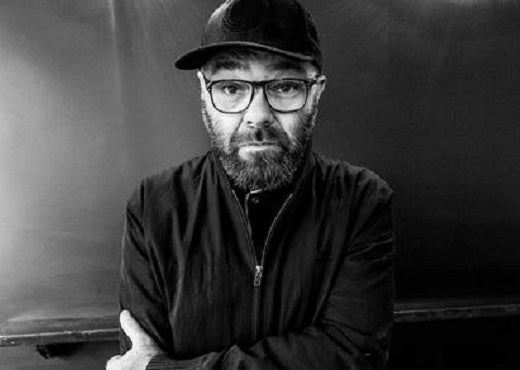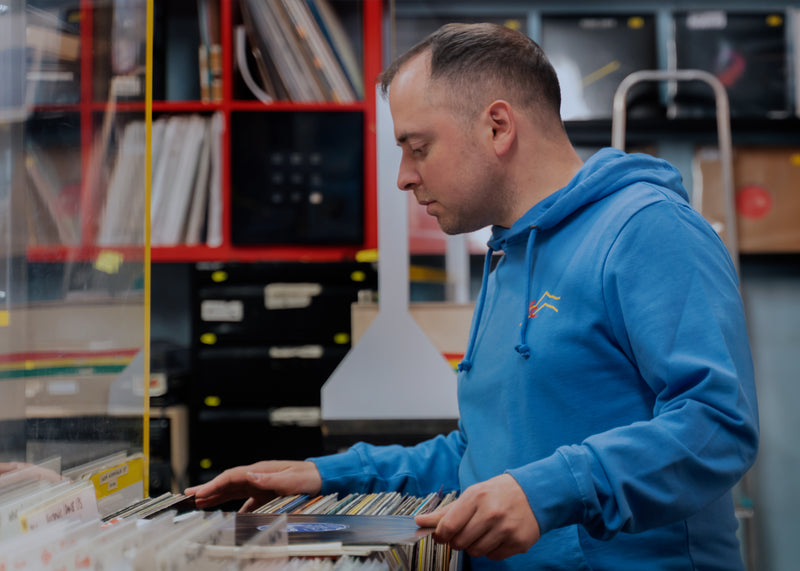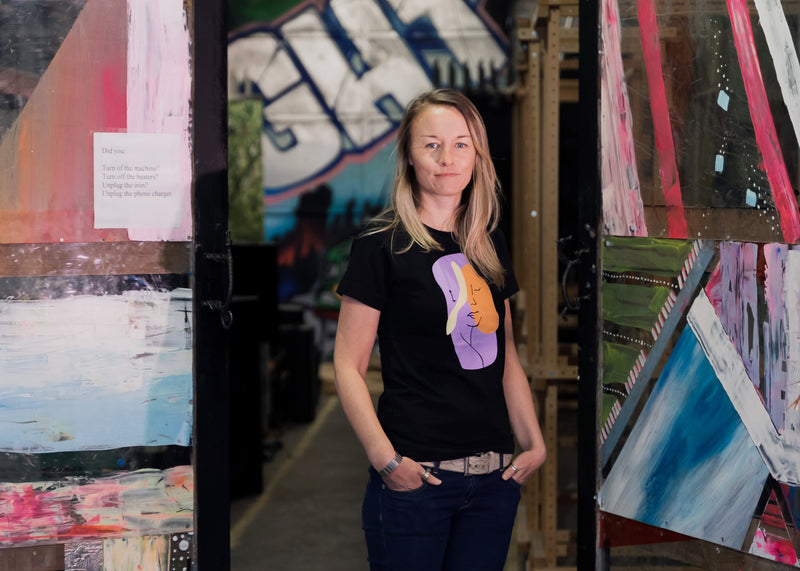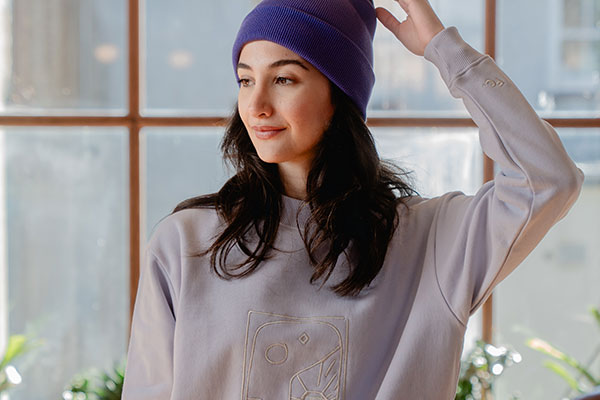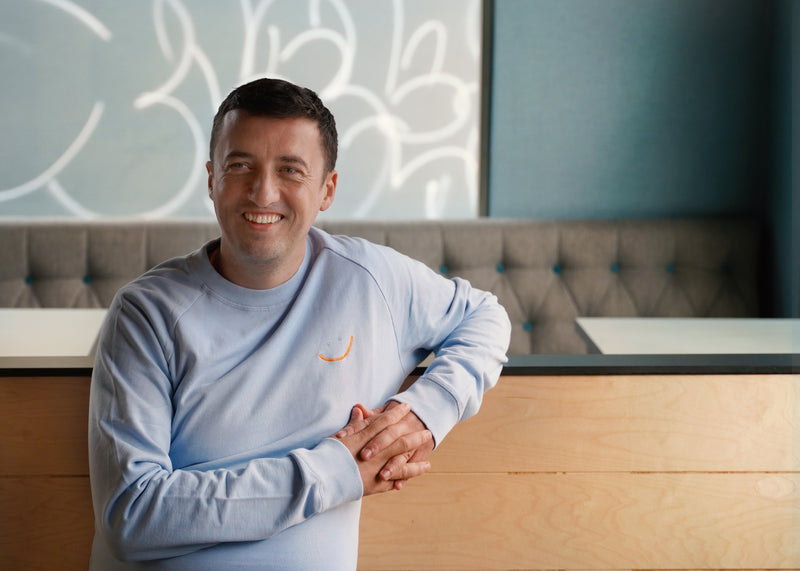
Colin wearing Happy out Jumper By fresh Cuts
In 2008 Colin Harmon of 3FE packed up a successful career as an investment broker, to focus on his real passion - coffee. A year later he was the reigning Irish Barista Champion, and had travelled to Atlanta to place 4th in the World Championships. Today the 3FE empire consists of 6 coffee shops, a web shop, a training business and a roastery that supplies quality coffee to businesses around Ireland.
We met up with Colin at Gertrude, 3FE’s flagship store on Grand Canal Dock, for some really good coffee and chats.
When we call in, the shop isn’t open to customers, but the kitchen is busy making the food for their other venues. Colin tells us they were lucky - because they sell coffee, they’ve been able to adapt and stay open over the last few months, and keep their staff in work.
His customers weren’t prepared to give up their coffee fix when offices shut down, and a surge in online orders and subscriptions helped balance the losses in the wholesale market. This helped more than the Irish business, 3FE has partnerships with farmers around the globe.
“At all times we tend to have tonnes of coffee on boats on the way that we can't just ask to turn around and go back. You’ve got people's livelihoods at every level of the value chain, so we need to keep rolling.”
It's a far cry from working in an office in the financial district, and we’re curious to know how a trustee officer for professional investment gets into coffee?

3FE COFFEE
“Probably through boredom I'd say!” he laughs. Colin had worked in hospitality since his first job in McDonalds on Grafton street. He describes it as “the busiest restaurant in the country by a good distance, and a real cultural hub at the time!” In a Dublin before mobile phones, McDonalds was the default meeting spot in town, and as a 15 year old, he loved the buzz of it all.
He funded his degree working in bars, restaurants and cafes until he graduated and settled in for a career in finance. He soon realized it wasn’t the right fit for him. “I got the ‘proper’ job, and I was like. I don't like this! I kind of wanted to go back to what I was doing before”
He made the decision to give himself a year out to try and build something within hospitality. In 2008 finance was booming, and there was no shortage of work. “Every week, you'd be getting emails from other companies trying to poach you for more money, it was bonkers.” Colleagues of his were taking time off to travel, and coming back to their choice of jobs, so it didn’t seem like that big a risk to do the same.
“About three months after I left my job, the world economy collapsed,” He tells us. “That kind of decided that.”
For anyone that may be dreaming of doing similar, Colin passes on some words of wisdom he received from a mentor, when he was trying to figure what direction to go in:
“He said, if you don't have any monetary capital, you need knowledge capital. So what I would advise you to do is to find one area that you're interested in, and just become the expert in that one thing.”
For him, that one thing was coffee. He’d developed a bit of an obsession over the years, hanging out on forums, researching beans, buying online from different roasteries and installing a ‘Frankenstein machine’ in his kitchen. His friends would call round to his apartment because his brews were better than the high street, and Third Floor Espresso grew from there.

32 Grand Canal Street Lower Dublin 2
3FE has helped propel Dublin towards what’s now a thriving Café scene. We ask Colin about his journey, and what coffee culture was like when he started out.
‘‘It's quite similar to the beer market” he tells us. “10 years ago people drank a lot of beer, but Irish beer wasn't very good!”
The best coffee in Dublin was being made by Karl Purdy of Coffee Angel, out of a little cart by the river, and Colin went to work for him. There was nowhere in Ireland you could really train, so Karl encouraged him to apply for the Irish barista championships as a way of mastering his skills.
6 months later Colin ‘accidentally won’, and found himself at the World Championships, which he describes as “like the Rose of Tralee of coffee” with “3000 people in tiered seating, cheering for Cappuccinos!”
This exposed him to a world of coffee that didn’t exist in Ireland at the time. “I was getting Ryanair flights to London and going on coffee tours to seven or eight different cafes, really interesting stuff. There was nobody here doing those sorts of things, so I could see there was an opportunity.”
When he first put out the idea of opening something here, no one really got it. The general response was “why would you open up a coffee shop? sure there's loads of coffee shops..” People were happy enough with what they had.
Fortunately, a friend brought Trevor O’Shea from Bodytonic around to Colin's place for a coffee, and it paved the way for his first venture. Trevor offered him use of the lobby of the Twisted Pepper nightclub, to see how Dublin took to specialty coffee. He opened in 2009, breaking the mold by selling only coffee - no treats, no tea, and slowly built up a following that were interested in what he was doing.

Colin's Book - What I know about running coffee shops
“‘Now there's more of an understanding of the fact that coffee has different values, it tastes different ways and there's different quality levels.” He tells us. “People are coming in asking if we have something that's rich and chocolatey, or a bit more acidic and fruity...It's still there to give them that jolt, but that's not the main conversation.”
Colin had been working and travelling overseas after the world championships, training and consulting. He’d had plenty of job offers, but chose to come back to Dublin instead. He tells us that a big factor in his decision was timing, and the economic crash.
He’d always wanted to set up a shop here, but he’d seen how things were during the boom, when “there was key money of a quarter of a million and it was impossible to get builders. There was no opportunity.” He knew that if he didn’t go for it then, it may never happen
‘‘People said it was an awful time to start a business, but actually it was great,” he says. “To me, it was like there's been a forest fire and there's green shoots coming through....If there wasn't a recession, 3FE wouldn't be here today.”
He notes that it was quite an innovative time, with interesting things happening across the board. “People were broke, but they wanted to do things...there was a big interest in food and drink and a lot of the new breweries and distilleries started then”
“I think over the next year or two we’re going to see a lot more people having a crack at things..because what have you got to lose? It's a lot more achievable given the way things are.”
What he’d like to see fixed in Dublin, is the issue of space. During 3FE’s stint in Twisted Pepper, the venue was also home to a roller derby, a bookshop, a record store, and a number of clothes shops. “It was a very achievable, low entry point to go have a crack at something...and those sort of environments aren't really there anymore”

3FE Coffee Roastery
We need these spaces to give our home-grown industries a start, and bring some life to the city, but they’re disappearing at an alarming rate.
“The retail spaces and the house prices and the office spaces all start to rise in value because of those things, and then all those things are forced out and.. well, there's no value left.”
When it comes to sustainability Colin reckons that “you have to accept that you're doing a lot of damage by existing in the first place, and then try and mitigate that as you go along”
It’s not just about your production and processes, but how you run your business.
“It has to infiltrate everything you do,” he believes. “Sustainability’s not just about reusable cups. Its core essence is the ability to keep doing what you want to do”
For 3FE, that means forging meaningful sustainable relationships with small farmers, so they can each grow and thrive. In his own life, it means looking beyond certifications and supporting businesses with a positive ethos, run by good people, and buying Irish. It’s about more than economics, he explains:
“Ireland as a country is coming up on 100 years of independence. But I think there's still so many things we’re restricted by, simply because we always have been - we’d never really thought about them before.”
Over the last 20 years we’ve been breaking out of this, and letting ourselves to branch out, take more risks and do new things, which is important. ‘‘You want to find someone that's doing something interesting at home, and see if you can support it. I think that's a really worthwhile thing”
Colin seems to have found his fit in the world of coffee. It’s a nice industry, he tells us. The small roasters are a close community and there’s a social payback to hospitality that he loves. “If we need a picture frame fixed, or have a pipe burst or something completely random, we're a customer away from solving that problem.. you get this wonderful network of people around you.”
There’s another payback in being able to help people in a simple, tangible way.
“People don't have a bad day at work, or wake up on the wrong side of the bed and say ‘I'll treat myself to a lexus’, you know? They just go get a nice cup of coffee… You're very literally just making people happy all the time, and there's something really nice about that”
Someone you know is visiting Dublin for 24 hours - where do you tell them to go?
I'd make sure they got on the DART and give them a good overall look at Dublin.
I'd bring them swimming in the 40 Foot, and then for a pint in O'Brien's. Maybe Etto for dinner. . We’d probably head to Drury street, or around there...get teas in Loose Canon, do some shopping for clothes and into Grogans for a pint - hop around that area for a while, pretend I do it all the time!
Where would you send someone to eat in Dublin? Delahunt, Etto And Meet Me In The Morning


